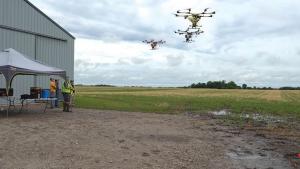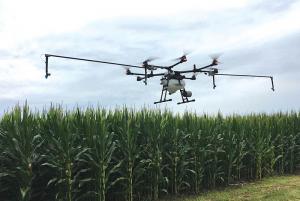Drone “Swarms” Seed Or Sprays Fields Fast
Looking for a new venture with sky-high potential? Independent contractors using the Rantizo drone application system tripled their income potential after the FAA recently approved Rantizo drone swarms. With a drone swarm, a single operator can now charge $450 per hour with 3 drones.
The $7.5 million in new funding the company received in early December will likely provide contractors another boost. Rantizo plans to expand into new markets, make new hires, and ramp up research and development.
“We are the only ones who have swarm approval,” says Michael Ott, Rantizo. “With the new investment, we are excited about these new opportunities and building quickly to capture them.”
Rantizo’s software platform and hardware use existing aerial imagery to identify problems and deliver precise field solutions. While drone use has been a hot topic in agriculture for years, the requirement of one licensed pilot per drone limited productivity.
An individual DJI Agras MG-1P drone used by a Rantizo application services contractor can cover about an acre per flight or 14 acres an hour in 20-ft. swaths. With swarming, Rantizo contractors can cover more acres in a day, which can be vital to growers facing limited application windows.
With drones equipped with a liquid tank and spray boom or a dry spreader, contractors can deliver crop protection products, nutrients, or seed to the spots that need it.
“We can go into a field with 80 percent weed control, but with herbicide resistant Palmer amaranth and spot spray just it,” says Ott. “This year was dry, but in 2019 there were wet spots in fields left unplanted. We were able to spread cover crops in them without disturbing the remainder of the field.”
The autonomous drones need minimal management. Flight paths and spot applications are mapped prior to field entry. The drones are equipped with terrain and collision avoidance. The main activities for the pilot are field entry, swapping out batteries every 2 to 3 flights, and reloading the application system.
“Currently reloading is a manual activity,” says Ott. “Very soon, we will have an autonomous loading system. Our goal is to reduce time on the ground from 2 min. to 30 sec. That will significantly improve productivity.”
He adds that the big advantage to autonomous reloading is being able to change up the batch automatically. Each batch can be designed specifically for the next area to be treated, whether with different herbicides, micronutrients or seeds.
Rantizo has nearly 30 contractors across the country, with at least one in each of the Midwestern states, as well as Oregon, California and as far east as Pennsylvania. Contractors purchase drones and collateral equipment from the company, such as liquid and dry applicators, batteries and a multi-battery charger. They also receive help getting appropriate federal operating licenses and state permits.
In addition, contractors qualify for a 2-day training program developed by Rantizo. An annual $3,500 per year support services fee provides contractors with ongoing technical and business support, including marketing and billing support and insurance coverage.
Ott has found that most states welcome Rantizo’s services and want to make drone application work. “Michigan had banned drone spraying,” he says. “However, once they learned about our program, it did everything they needed, and it was approved.”
The base price for a drone offered by Rantizo is $14,500. Upgrades like the spray kit or dry spreader are extra. While individual components can be purchased, service contractors tend to buy turnkey packages.
Contact: FARM SHOW Followup, Rantizo, 105 Iowa Ave., Suite 231,
Iowa City, Iowa 52240 (ph 319 201-3020;
info@rantizo.com; www.rantizo.com).

Click here to download page story appeared in.
Click here to read entire issue
Drone “Swarms” Seed Or Sprays Fields Fast CROPS Miscellaneous Looking for a new venture with sky-high potential? Independent contractors using the Rantizo drone application system tripled their income potential after the FAA recently approved Rantizo drone swarms With a drone swarm a single operator can now charge $450 per hour with 3 drones The $7 5 million in new funding the company received in early December will likely provide contractors another boost Rantizo plans to expand into new markets make new hires and ramp up research and development “We are the only ones who have swarm approval ” says Michael Ott Rantizo “With the new investment we are excited about these new opportunities and building quickly to capture them ” Rantizo’s software platform and hardware use existing aerial imagery to identify problems and deliver precise field solutions While drone use has been a hot topic in agriculture for years the requirement of one licensed pilot per drone limited productivity An individual DJI Agras MG-1P drone used by a Rantizo application services contractor can cover about an acre per flight or 14 acres an hour in 20-ft swaths With swarming Rantizo contractors can cover more acres in a day which can be vital to growers facing limited application windows With drones equipped with a liquid tank and spray boom or a dry spreader contractors can deliver crop protection products nutrients or seed to the spots that need it “We can go into a field with 80 percent weed control but with herbicide resistant Palmer amaranth and spot spray just it ” says Ott “This year was dry but in 2019 there were wet spots in fields left unplanted We were able to spread cover crops in them without disturbing the remainder of the field ” The autonomous drones need minimal management Flight paths and spot applications are mapped prior to field entry The drones are equipped with terrain and collision avoidance The main activities for the pilot are field entry swapping out batteries every 2 to 3 flights and reloading the application system “Currently reloading is a manual activity ” says Ott “Very soon we will have an autonomous loading system Our goal is to reduce time on the ground from 2 min to 30 sec That will significantly improve productivity ” He adds that the big advantage to autonomous reloading is being able to change up the batch automatically Each batch can be designed specifically for the next area to be treated whether with different herbicides micronutrients or seeds Rantizo has nearly 30 contractors across the country with at least one in each of the Midwestern states as well as Oregon California and as far east as Pennsylvania Contractors purchase drones and collateral equipment from the company such as liquid and dry applicators batteries and a multi-battery charger They also receive help getting appropriate federal operating licenses and state permits In addition contractors qualify for a 2-day training program developed by Rantizo An annual $3 500 per year support services fee provides contractors with ongoing technical and business support including marketing and billing support and insurance coverage Ott has found that most states welcome Rantizo’s services and want to make drone application work “Michigan had banned drone spraying ” he says “However once they learned about our program it did everything they needed and it was approved ” The base price for a drone offered by Rantizo is $14 500 Upgrades like the spray kit or dry spreader are extra While individual components can be purchased service contractors tend to buy turnkey packages Contact: FARM SHOW Followup Rantizo 105 Iowa Ave Suite 231 Iowa City Iowa 52240 ph 319 201-3020; info@rantizo com; www rantizo com
To read the rest of this story, download this issue below or click
here to register with your account number.








